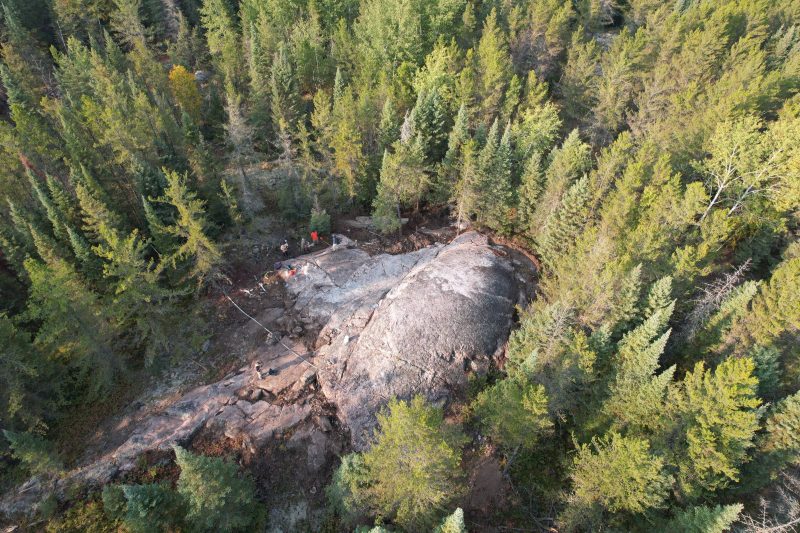
Dr. Alfredo Camacho and Dr. Mostafa Fayek and working to sustainably develop critical minerals in Manitoba.
UM researchers to develop sustainable extraction methods for critical minerals
Dr. Mostafa Fayek and Dr. Alfredo Camacho receive $1.5 million in NSERC Alliance Missions grant funding
UM researchers are collaborating with industry and academic partners to develop innovative technologies and sustainable practices to address key issues related to critical metals exploration and extraction. A team led by Mostafa Fayek receiving more than $1.5 million in Alliance Missions grant funding is working to unlock the full mineral resource potential of Manitoba.
Critical metals, including lithium, copper, nickel, and platinum play a vital role in high-tech renewable energy and electronics manufacturing industries. However, their extraction and processing present unique environmental challenges.

Drone capture of mineral exploration.
To minimize environmental impacts, the Fayek Team seeks to generate transformative knowledge of the geologic and chemical interactions that initially formed these deposits. This approach will reduce costs, by providing a set of new sustainable guidelines, especially in sensitive Northern environments.
Mostafa Fayek, Distinguished Professor, Clayton H. Riddell Faculty of Environment, Earth, and Resources is the Founding Director of the Earth Materials and Archaeometry Center. Co-leading the project is Alfredo Camacho, Professor, Clayton H. Riddell Faculty of Environment, Earth, and Resources. The research partners also co-Direct the Manitoba Isotope Research Facility.
“Our research will promote and strengthen existing links with international researchers, generating knowledge transfer to Canada,” says Fayek. “Indigenous people are underrepresented in STEM fields in general, and our project seeks to remove barriers and directly engage Indigenous people in mineral exploration.”
Mining plays an important yet underrepresented role in Manitoba’s economy according to current reports by the Provincial Government, with an estimated $1.9 billion in mineral production value. Manitoba holds great potential for environmentally sustainable development due to 99 per cent renewable hydro electric energy in situ with globally significant deposits of critical minerals including lithium, copper, nickel and silica.
“This funding represents a significant milestone in our efforts to strengthen Manitoba’s position as a leader in critical metals research and innovation,” says Mario Pinto, Vice-President (Research and International). “This investment represents a commitment to scientific excellence in the emerging green and digital economy. The exemplary work of these UM researchers underscores the importance of collaboration with private industry, government and Indigenous stakeholders to drive innovation and economic growth.”
The project team also includes Dr. Peter Hollings, Industrial Research Chair in Mineral Exploration from Lakehead University, and national industry partners. Grid Metals Corp., focused on lithium and copper/nickel projects in the Bird River area near Winnipeg, and New Age Metals, a large mineral claim holder in the Lac du Bonnet region.
“By harnessing the collective expertise of academia, industry, and government, we can address the complex challenges facing the critical minerals industry and create sustainable solutions for the future,” says Harry Barr, Chairman and CEO of New Age Metals.

Dr. Colin Gilmore
Alliance Missions grants are provided by the Government of Canada in support of the commitment to drive innovation for sustainability in the critical metals sector. Canada’s Critical Minerals Strategy released last year outlines a strategy for circular economic development in Canada to reduce the environmental impacts of mineral extraction.
Another project receiving $680 thousand in Alliance Missions funding is led by Colin Gilmore, Canada Research Chair in Applied Electromagnetic Inversion with the Price Faculty of Engineering. The Gilmore Team at the UM Electromagnetic Imaging Lab is partnering with industry partner EarthEx to develop Canadian-made sensors and training highly qualified personnel to reduce the overall impact of mineral development on our environment.
Research at the University of Manitoba is partially supported by funding from the Government of Canada Research Support Fund.






